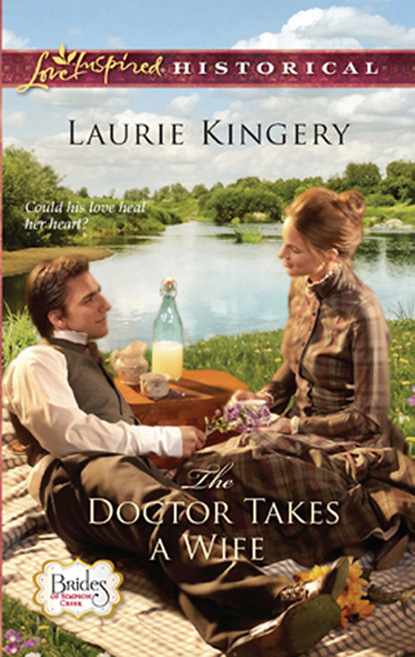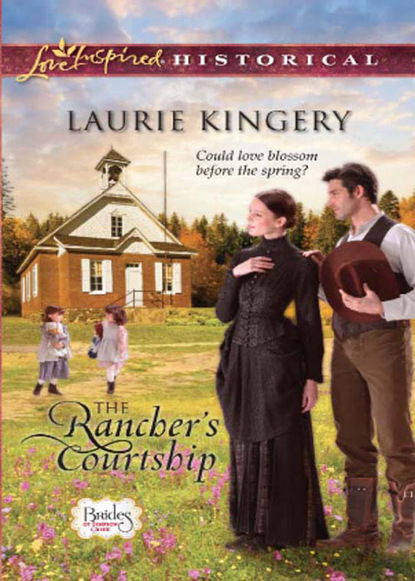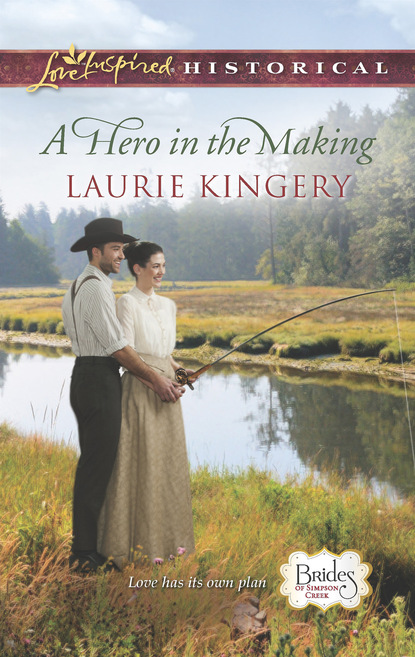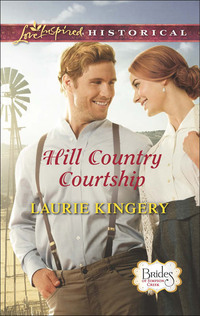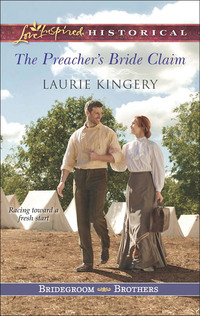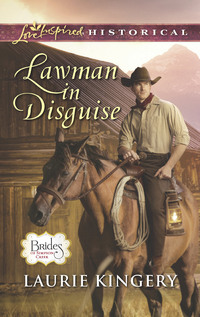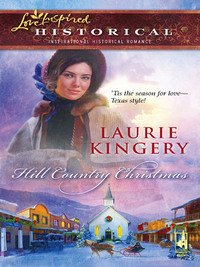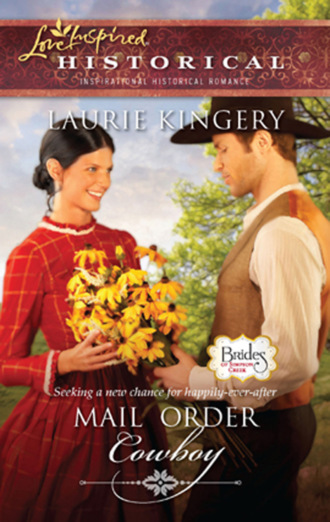
Полная версия
Mail Order Cowboy

“Mr. Brookfield, there are several other ladies to choose from…”
Millicent turned to face Nicholas. “Before we say anything more, I feel compelled to point out that I’m merely the one who composed the advertisement. I assure you, it’s quite all right if you find you prefer another of them.”
So Miss Matthews had a sense of fair play and generosity. Nick liked that about her. But somehow he knew her suggestion was something he didn’t even want to consider. It was incomprehensible how he could sense that already, but there it was.
“I know you will find this difficult to believe, since we’ve only just met, and we really don’t know each other at all,” he said. “I can well understand that it appears I’m making a snap judgment, and perhaps I am, but I would like the opportunity to get to know you better. I—I find you very attractive indeed, Miss Matthews, and that’s the simple truth….”
LAURIE KINGERY
makes her home in central Ohio, where she is a “Texan-in-exile.” Formerly writing as Laurie Grant for Harlequin Historical and other publishers, she is the author of eighteen previous books and the 1994 winner of a Readers’ Choice Award in the short historical category. She has also been nominated for Best First Medieval and Career Achievement in Western Historical Romance by RT Book Reviews. When not writing her historicals, she loves to travel, read, participate on Facebook and Shoutlife and write her blog on www.lauriekingery.com.
Laurie Kingery
Mail Order Cowboy

MILLS & BOON
Before you start reading, why not sign up?
Thank you for downloading this Mills & Boon book. If you want to hear about exclusive discounts, special offers and competitions, sign up to our email newsletter today!
SIGN ME UP!
Or simply visit
signup.millsandboon.co.uk
Mills & Boon emails are completely free to receive and you can unsubscribe at any time via the link in any email we send you.
What doth the Lord require of thee, but to do justly, and to love mercy, and to walk humbly with thy God?
—Micah 6:8
To my wonderful editor, Melissa Endlich,
who always makes me strive to be the best writer I can be, and always, to my husband, Tom
Contents
Prologue
Chapter One
Chapter Two
Chapter Three
Chapter Four
Chapter Five
Chapter Six
Chapter Seven
Chapter Eight
Chapter Nine
Chapter Ten
Chapter Eleven
Chapter Twelve
Chapter Thirteen
Chapter Fourteen
Chapter Fifteen
Chapter Sixteen
Chapter Seventeen
Chapter Eighteen
Chapter Nineteen
Chapter Twenty
Chapter Twenty-One
Chapter Twenty-Two
Chapter Twenty-Three
Chapter Twenty-Four
Chapter Twenty-Five
Chapter Twenty-Six
Chapter Twenty-Seven
Chapter Twenty-Eight
Chapter Twenty-Nine
Letter to Reader
Questions for Discussion
Prologue
Simpson Creek, Texas, July 1865
“The problem, as I see it,” Millicent Matthews announced in her forthright way, looking around the edges of the quilt at the members of the Ladies Aid Society, “is that we unmarried ladies are likely to remain so, given the absolute lack of single men who’ve come home to Simpson Creek from the war. The few men who did return were already married, and while I’m very happy for their wives, of course—” she added quickly as one of the town’s matrons looked up “—the rest of us will have to leave or remain single unless Decisive Action is Taken.”
“Oh, I don’t know, Milly,” said her sister Sarah, staring down at the Wedding Ring pattern as if it held the answer to their dilemma. “Perhaps not all of our men are able to travel yet from wherever they were when the war ended. They might be recovering from wounds, or the effects of confinement in northern prisons…”
Milly felt a rush of compassion for Sarah, whom she knew was still holding out hope that her beau would yet return, despite the fact he had been reported missing in action late last year. Since then, they’d heard nothing more. “Sarah, it’s July,” she pointed out gently but firmly. “The war was over in April. We’ve seen the casualty lists. All the other Simpson Creek men have been accounted for, one way or the other. The ones who survived have managed to make it to Texas. If Jesse was still recovering elsewhere, surely he would have sent word by now.” She let the statement hang in the air.
Sarah’s gaze fell to her lap and her lip quivered. “I…I know you’re right, Milly. I just keep hoping…”
Across from them, Mrs. Detwiler pursed her lips.
Milly laid a hand comfortingly on her sister’s shoulder. She was sure the color of Sarah’s dove-gray dress was a concession to her uncertainty as to whether she was mourning or waiting.
Milly was just about to say “Jesse would want you to move on” when Mrs. Detwiler cleared her throat.
“We need to accept the lot in life that the Lord sees fit to give us,” the woman said heavily, clutching the mourning brooch on her bodice. “I lost my own dear George ten years ago, God rest his soul, and I have learned to resign myself to my widowhood, even—dare I say it—treasure my single state.” Her expression indicated Sarah would do well to be so wise.
“Mrs. Detwiler, I admire the way you’ve adapted to your loss,” Milly began tactfully, not wanting to offend the widow of the town’s previous preacher. “But you had many happy years with Mr. Detwiler, and raised several children.”
“Seven, to be exact.” Mrs. Detwiler sniffed, and raised her eyes heavenward.
“Seven,” Milly echoed. “But Sarah and I and several others here—” she saw furtive nods around the quilt frame “—are young, and have never been married. We’d like to become wives and raise children, too. And there are others who were widowed by the war and left with children to raise and land to work or businesses to manage. They need to find good husbands again.”
“In my opinion, you would do better to devote yourselves to prayer and good works, Miss Matthews, and let the good Lord send you a husband if He wishes you to have one.”
Milly could feel Sarah tensing beside her. Sarah never liked confrontations. But Milly had seen the spark of interest and approval in the eyes of half a dozen young ladies plying their needles on the quilt, and their silent support emboldened her.
“I agree that prayer and good works are important to every Christian, of course, and I have been praying about the matter. Sometimes I think the Lord helps those who help themselves.”
At this point Mrs. Detwiler cleared her throat again. Loudly. “I hardly think this is the time or place to discuss such a frivolous topic.” From her pocket, she pulled out a gold watch, a legacy of her dear departed George. “I must return home soon, and we have not yet discussed the raffle to be held for the Benefit of the Deserving Poor of San Saba County. If we don’t stop chattering and keep stitching, ladies, this quilt will not be ready to be raffled off at the event.”
Milly tucked an errant lock of dark hair that had escaped the neat knot at the nape of her neck and bit back a sigh of frustration. As president of the Ladies Aid Society, Mrs. Detwiler had an obligation to keep the meetings on track, but she suspected the widow was all too happy to have an excuse to stifle the discussion.
“You’re right, Mrs. Detwiler, of course. I’m sorry if I spoke out of turn,” she said in the meekest tone she could manage. “Perhaps it would be best to discuss this subject at another time, with only those concerned present. So why don’t the unmarried ladies who are interested meet back here again tomorrow, say at four o’clock? We’ll serve lemonade and cookies.”
Chapter One
“Sarah, thank you again for making the cookies and the lemonade,” Milly whispered as the ladies began to arrive in the Simpson Creek Church social hall. It must have been the dozenth time she’d thanked her sister since volunteering to supply refreshments, knowing it would be Sarah who actually made the cookies. Milly’s baking efforts always ended up overbrowned, if not completely charred.
“I told you, you’re welcome,” Sarah whispered back, smiling. “I couldn’t run a meeting the way you’re about to. We all have our gifts.”
Milly was none too sure she had any gifts worth boasting of, but what she was about to propose to these ladies had been her idea.
“Sarah, we’re going to need more chairs,” she whispered again, this time in pleased astonishment as women kept filing in. They had set out only half a dozen, including the ones for her and Sarah. The next few minutes were a busy bustle of carrying chairs and making a bigger circle. Finally, in all, there were ten never-married ladies and two widows, plus the mother of Prissy Gilmore, who probably wanted to keep a careful eye on what Milly Matthews was proposing—especially because Prissy’s father was the mayor.
“Ladies, I want to thank you all for coming,” Milly said, pitching her voice louder than the buzz of conversation as everyone settled themselves in their chairs and greeted one another. “I’d like to open this meeting with prayer.” She waited a moment while everyone quieted and bowed their heads.
“Our heavenly Father,” Milly began, “we ask You would bless us this day and direct our efforts as we seek to find an answer to a problem. Guide us and bless us, and keep us in the center of Your will. Amen.” She raised her head, and as the others raised theirs and opened their eyes, she saw them looking expectantly at her.
Milly took a deep breath. “As I was saying two days ago as we worked on the quilt, we single women in Simpson Creek face a problem now that the war is over and there are no single men here—”
“So what are you proposing we do, Milly?” interrupted Prissy Gilmore impatiently. “Become mail order brides and leave Simpson Creek?”
Milly laughed. “Merciful heavens, no! I’m not going to, anyway. I love this town. I don’t want to leave it and Sarah and go marry, sight unseen, some prospector in Nevada Territory or a widower farmer with a passel of children in Nebraska. I want a husband who can run the ranch Papa left us and defend it against the Comanches if they come raiding. Y’all know Sarah and I have been coping—” barely, she thought “—with only our foreman, old Josh, and his nephew Bobby to help us.”
Josh and Bobby weren’t enough, she knew. Once, the Matthews bunkhouse had housed six other cowhands, with more hired at roundup time. Josh was old and becoming more and more crippled with rheumatism, while Bobby wasn’t even shaving yet.
Josh had taken her aside only the night before and explained that if they didn’t find a way to make the ranch productive again, they might lose it to taxes. They were already losing cattle left and right to thieving Indians and rustlers, but there was no way an old man and a young boy could protect the place.
“Maybe y’ought to sell out and move into town, Miss Milly,” Josh had said. “Don’t worry ’bout me ’n the boy. We’ll find a place somewhere.” But who would hire such an old cowboy and a boy still wet behind the ears?
“I’m sure you could interest some Yankee soldier or his carpetbagger friend in your ranch,” Martha Gilmore, Prissy’s mother, suggested with a smirk. “They’d be only too willing to marry you to get their hands on a good piece of Texas ranch property.”
Several of the young ladies looked dismayed. “Y-you wouldn’t do something like that, would you, Milly?” asked Jane Jeffries, a young widow who still wore black despite losing her husband midway through the war.
“Of course not, Jane,” Milly assured her. “I’m looking for a good Texas man, or at the very least, a Southerner. I do realize there are some things worse than being an old maid. Marrying a Yankee soldier or a carpetbagger certainly falls into that category.”
“I’m relieved to hear you say so,” Emily Thompson said from across the circle. “So what course of action did you have in mind?”
Milly stared out the open window of the church social hall. “I thought perhaps we could place an advertisement in a newspaper, not the Simpson Creek News, of course, but a larger city’s newspaper such as the Houston Telegraph. It just so happens our Uncle William is the editor of that paper, so I’m sure he’d help us.” She smiled at the other ladies. “We’ll include a post office address where interested bachelors could reply. Of course they’d be required to send references, and a picture, if at all possible.”
“You mean,” asked Martha Gilmore, “to enlist mail order grooms?”
Milly blinked, startled to hear her idea summed up that way, as several around the circle tittered. She considered the phrase. “Yes, I suppose you could call them that.”
“Oh, Milly, I don’t know…” Sarah murmured un easily.
Milly pretended she hadn’t heard. Sarah was always apprehensive about daring new ideas. “Who’s with me?” she asked, making eye contact with each in turn—Prissy Gilmore, Jane Jeffries, Ada Spencer, Maude Harkey, Emily Thompson, Caroline Wallace, Hannah Kennedy, Bess Lassiter, Polly Shackleford, Faith Bennett. And they met her gaze, some shyly, some boldly, but all with interest.
“How would such an ad read, Milly?” asked Ada Spencer curiously.
Milly thought back to what she had begun composing in her mind at the meeting once Mrs. Detwiler had redirected the conversation. “I’m open to suggestions, of course, but here’s what I had so far,” she said, pulling a folded sheet of paper from her reticule. “Wanted: Marriage-Minded Bachelors,” she read aloud. “Quality Christian gentlemen who desire to make the acquaintance of refined, genteel young ladies with a view to matrimony are requested to send a letter to—and here we would need a name for our group, ladies—References are required, and those sending photographs will be given preference. Drunkards, Yankees, Carpetbaggers and other riffraff need not apply.”
“I think that’s excellent, Milly!” Maude Harkey cried, clapping. “Bravo! You’ve certainly covered everything.”
Some of Milly’s apprehension left her in the face of Maude’s enthusiasm and the approving glances of several ladies around the circle. “Thanks, Maude,” Milly said. “But we need a name for this group. What shall we call our organization? The Marriageable Misses? The Wedding Club?”
Mrs. Gilmore looked as if she wanted to say something but she held her peace.
“How about The Simpson Creek Society for Promotion of Marriage?” Caroline Wallace suggested.
It was a more formal name than Milly would have preferred, but she wanted each lady to feel she had a say in the formation of their organization, and everyone seemed to like this one.
“All right, that seems to be the consensus,” Milly said. “That’s what we’ll call ourselves. The rest of the advertisement could read, ‘Inquiries should be directed to the Simpson Creek Society for the Promotion of Marriage at post office box number—’ Caroline, can we arrange for a post office box before we leave town so I know what number to put in the ad?”
Caroline, the daughter of the postmaster, nodded. “I happen to know number seventeen is empty. I’ll tell Papa.”
“Will you need any money for the advertisement, Milly?” asked Jane Jeffries. Several of the ladies’ faces registered dismay. If there was one other thing the unwed ladies of Simpson Creek lacked, it was ready cash.
“I don’t think so,” Milly said, and hoped it was true. “I’ll write to my uncle this very day, sending our advertisement copy.” She was counting on Uncle William to run the advertisement gratis, or at the very least run it at a discount.
“Well, I think that went well, don’t you?” Milly said, after the last of the ladies had gone home and she and Sarah were alone in the social hall. She munched on one of the few cookies that hadn’t been devoured by the Simpson Creek Society for the Promotion of Marriage.
“Yes…yes, it did,” Sarah said, her tone thoughtful as she scooped up the plates and cups filled with crumbs and remains of the lemonade. “They all seemed very excited about your ideas.”
“But what about you, Sarah?” Milly asked. She hadn’t been able to gauge Sarah’s reaction during the meeting. “Are you going to be one of us, or do you think it’s a foolish idea? Would you rather I hadn’t suggested it?”
Sarah’s green eyes lost focus. “I…I don’t know. Won’t it look as if we’re somewhat…oh, I don’t know…fast?”
“Oh, I don’t think so, not if the advertisement is worded properly, as I believe it is,” Milly said. She had been very satisfied when the group agreed that the words she had composed in her head were perfect as they stood. “We’ll be able to tell by the tone of their letters if they’ve gotten the wrong impression, I should think, and we simply won’t extend an invitation to come and meet us.”
“I suppose you’re right…” Sarah said, but her tone was far from certain. “But Milly, what if—what if the men who answer the advertisement lie about their qualifications? What if they turn out to be men of bad character? Why, a man could say anything about himself on paper, and turn out to be quite the opposite,” Sarah said, twisting a fold of her apron. “Why, he could be an outlaw, or a cardsharp—or a Yankee!”
“That’s true,” Milly admitted frankly. “But if we find that to be the case, we’ll send them packing. And you know, there are no guarantees when one meets a man in the usual way either,” she pointed out.
Sarah looked puzzled. “Whatever do you mean?”
“Just look at that woman in Goliad we heard about, Bertha McPherson,” Milly said, with a wave of her hand, as if the woman stood before them. “She married that fellow from Goliad who courted her for six months, and once they tied the knot, she found out he still had a living wife back in St. Louis.”
Sarah sighed. “I always thought we’d marry boys from Simpson Creek, boys we’d known all our lives.”
“I know…” Milly had thought so, too. Just as she had believed the brave talk of the boys who’d marched off to war, promising they’d be back, victorious, in six months. “Yes, what we’re doing is a leap of faith,” she admitted. “But would you rather take a chance, or die an old maid? I don’t want to be called ‘Old Maid Milly Matthews,’ thank you very much.”
“They’re already calling you ‘Marrying Milly’,” Sarah said, then put a hand over her mouth as if she hadn’t meant to say it.
Milly blinked. “Who’s ‘they’?”
“Folks in town,” Sarah said, facing her sister as Milly also sank into a chair beside her. “I overheard Mr. Patterson talking to Mrs. Detwiler in the mercantile yesterday. They hadn’t seen me come in. She was telling him what you’d said in the Ladies Aid Society meeting the other day. Folks in town are already calling us the Spinsters Club.”
Milly winced but reached out and put an arm around her sister’s shoulder. “We mustn’t mind what people say, Sarah. People will always gossip.” She hadn’t missed the fact that Sarah had said us, and her heart glowed with love for her. Worried as she was, her sister was joining her in this project.
“Have you prayed about this?” Sarah asked. “I mean, I know we opened the meeting with prayer—that was a lovely prayer you said, by the way—but have you been praying about this? A lot?”
“Of course,” Milly said. “I’ve been praying for months, ever since the war ended and those first few men started returning, and none of them were the single men on the Missing in Action lists. But I suppose we’d both feel more confident if we prayed now, right?” They had always prayed together, first as a family and now just the two of them, after losing first their mother and more recently their father. Milly had always found it a source of strength.
Sarah nodded. Milly took her hand, and they bowed their heads and sought the Lord’s blessing on their enterprise.
Chapter Two
Nicholas Brookfield, late of Her Majesty’s Bombay Light Cavalry, reined in the handsome bay he had purchased after leaving the stagecoach and studied Simpson Creek. A small town, more like a village really, consisting of one main street, with a sprinkling of buildings on both sides of the dusty thoroughfare. Signs proclaimed the presence of a saloon, a boardinghouse, a general store, a livery, a combination barbershop-bathhouse, and at the far end of the street, a church. Branching off from the middle of the main street was another road with several houses of various sizes, some sturdy-looking fieldstone or brick two-stories, others smaller and of more humble construction, wood and even adobe cottages.
He wondered if Miss Millicent Matthews lived in any of these, or if her home was out on one of the ranches he’d passed on the road into Simpson Creek. And for the twentieth time, he wondered if he was on a fool’s errand. Had the intermittent fever he was prone to, and which had laid him low once again when he arrived in Texas a week ago, finally seared his brain, rendering him mad? What else explained why he’d let curiosity take control and come here in search of the writer of that intriguing advertisement, instead of going straight to Austin to the job that awaited him?
He glanced at his clothing, deeming it too dusty from his travels to make a good impression on a lady. Pulling out his pocket watch, a gift from his brother when Nicholas achieved the rank of captain, he discovered it was only eleven. He would do well, he decided, to bespeak a room at the boardinghouse and visit the barbershop-bathhouse before paying a call on Miss Matthews, assuming someone in this dusty little hamlet would tell him where he could find her.
“Have there been any inquiries about our advertisement?” Prissy Gilmore asked, after all the ladies of the Simpson Creek Society for the Promotion of Marriage had settled themselves in a circle in the church social hall.
“Not yet,” Milly admitted, as cheerfully as she could manage. “But it has been only two weeks. It would take time for a man to read the advertisement, compose a letter, perhaps have a tintype taken if he doesn’t have one ready, and for that letter to reach the Simpson Creek post office.” Afraid of discouraging her friends, she wasn’t about to admit she had made a pilgrimage to the post office every other day this week, and her only reward had been the letter she now brought out from her reticule.
“However,” she said, smiling as she drew it out of the envelope and unfolded it, “I do have this note from our Uncle William, who you will remember is the editor of the Houston Telegraph.”
“Dear Millicent and Sarah,” she read, “I hope this letter finds you well. I wanted you to know I am in receipt of your rather interesting advertisement copy and have published it (though I must confess with some trepidation as to what your late father would have thought of your scheme) in accordance with your request. I have to say this advertisement caused no small amount of talk in the Telegraph office and around the town. Word of it and of your group has spread to those cities with whose newspapers we share articles, so it may be possible that you will receive inquiries from as far away as Charleston, South Carolina, and even New York City.”
Milly folded up the letter and stuck it triumphantly back in her pocket without reading the paragraph that followed, in which her Uncle William implored her to be very cautious in meeting the gentlemen who would write in response.
“So you see, ladies,” she said, infusing every word with confidence, “our advertisement has made a stir. I’m sure we will begin receiving inquiries any time now—perhaps even in today’s post!”


